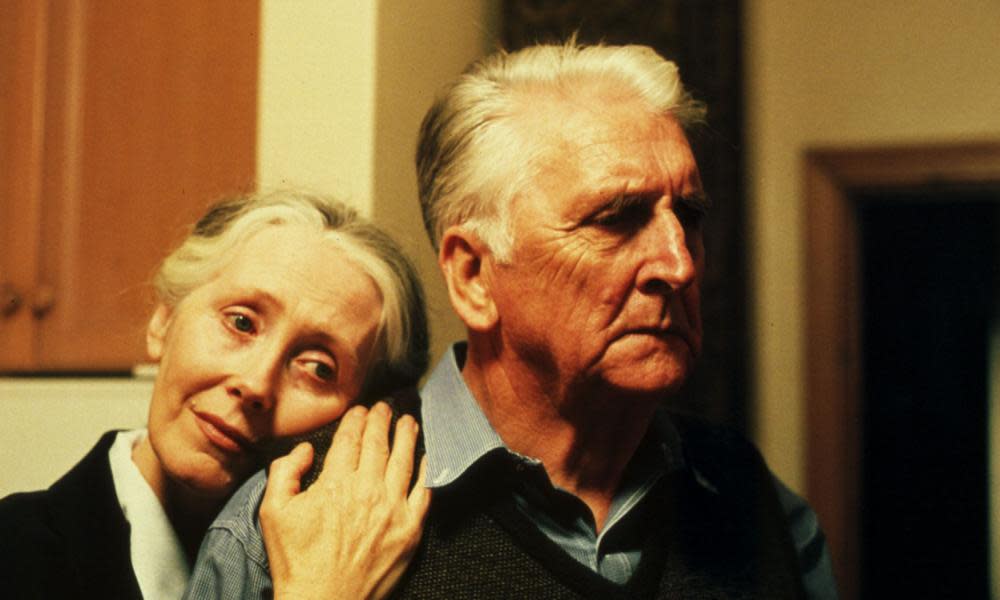Remembering Terry Norris: the Australian actor who charmed in dozens of roles

Terry Norris was one of those Australian actors who, like Bud Tingwell, seemed to many of us perennially old – as if he entered the zeitgeist already brilliantly matured. The opposite is true: the veteran performer, who passed away this week aged 92, spent decades refining his craft, beginning his career in television in the 60s. Norris’ earlier work includes Australian productions that were popular in their time but have faded in the zeitgeist – such as the 70s police drama Cop Shop and the rural soap opera Bellbird. Norris is survived by his three children and his wife, the great Australian actor Julia Blake.
Accruing dozens of screen credits over many years, Norris played many small or small-ish parts. But his impact was large, and he made his scenes resonate. And he kept busy: the actor told TV Tonight in 2018 that he had “20 years with the longest run of luck of any actor on the face of the Earth” and “was never, ever out of work”. In 1982, he made a career switch into Victorian state politics, where he remained for a decade, becoming the Labor member for Noble Park then later Dandenong. Former Labor politician Martin Foley tweeted that Norris was “a great mentor to all those who followed him” and his death was “a sad loss”.
Related: Jack Irish review – Guy Pearce turns up the noirish charm in new TV series
Norris’ most memorable role in recent years was as an adorably crusty barfly in the Jack Irish TV movies and series, playing one of a small group that Guy Pearce’s titular gumshoe affectionately refers to as “the Fitzroy youth club”. These blokes drink beer, grumble, and watch footy. By the third and final Jack Irish season, Norris’s character, Eric, has been relocated to a nursing home but remains in fine form, kvetching about a favourite topic: how their local watering hole has gone to the dogs. “I heard they got kombucha on tap!” he exclaims, describing it as “just bloody bacteria” and asking what’s next: “salmonella on a petri dish?”

In his son-in-law Robert Connolly’s 2015 family movie Paper Planes, Norris plays George, grandfather of Ed Oxenbould’s protagonist, Dylan. In an early scene, Dylan visits George at a nursing home and asks him for advice on how to fly planes. Norris suggests, “Maybe we can fashion some sort of a small engine and fix it to the airframe!” When Dylan points out that’s probably not allowed, Grandpa returns: “We could make it very small, so no one would notice.” During the big paper plane flying championship in Japan, Grandpa can be seen beaming on a live TV cross; it’s very sweet.
Related: Paper Planes review – Aussie family drama hits the spot
Norris delivered another charming – and in this instance, quite odd, performance – in Sue Brooks’ 2015 missing person drama Looking for Grace. He played Tom – an over-the-hill detective hired by two parents (Radha Mitchell and Richard Roxburgh) to look for their missing daughter (Odessa Young). He’s the sort of investigator who would inspire faith in nobody. Norris provides both gravitas and gentle comedy, imbuing scenes with oblique lines like “funny thing, life”.
In Paul Cox’s fine 2000 drama Innocence, the casting was close to home – with Norris and his wife, Blake, playing John and Claire, a couple who’ve been married for decades. This conversational film has a lovely ebb and flow, though things get serious when Claire has an affair with an old lover: Bud Tingwell’s Andreas. Norris brings out his character’s emotions beautifully – he’s confused, hurt, anguished, bewildered – and chips away at the stoic Australian male. When John’s son asks him what he would say if Claire entered the room, his emotionally stunted father is unable to answer the question, let alone form words like “I love you”.
In real-life, nobody has a problem directing such affection towards Norris himself. He was well respected, well-liked, and will be missed.

 Yahoo Movies
Yahoo Movies 
